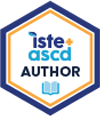
Event Information

Audience poll & padlet - how do you use GenAI for teaching and learning?
Introduction & Overview to the GenAI in Education Course (for context) 8 mins
Sharing of diverse applications of genAI from students working in a range of teaching contexts for example, Early Childhood, Bilingual and ELL education, high school language arts, Elementary education, Middle School, Special Education, Higher Education. We would like a range of unique applications. (6 people x 5 minutes each - 30 mins)
Audience shares ideas and questions (10 minutes)
Educators share 3 tips each to get started (8 mins)
Wrap up & sharing of resources (we will share tips and examples)
Ahmad, N., Murugesan, S., & Kshetri, N. (2023). Generative Artificial Intelligence and the Education Sector. Computer, 56(6), 72–76. https://doi.org/10.1109/MC.2023.3263576
Baidoo-Anu, D., & Owusu Ansah, L. (2023). Education in the era of generative artificial intelligence (AI): Understanding the potential benefits of ChatGPT in promoting teaching and learning. SSRN Electronic Journal. https://doi.org/10.2139/ssrn.4337484
Bergviken Rensfeldt, A., Hillman, T., & Selwyn, N. (2018). Teachers ‘liking’ their work? Exploring the realities of teacher Facebook groups. British Educational Research Journal, 44(2), 230–250. https://doi.org/10.1002/berj.3325
Borge, M., & Mercier, E. (2019). Towards a micro-ecological approach to CSCL. International Journal of Computer-Supported Collaborative Learning, 14(2), 219–235. https://doi.org/10.1007/s11412-019-09301-6
Bruguera, C., Guitert, M., & Romeu, T. (2019). Social media and professional development: A systematic review. Research in Learning Technology, 27(0). https://doi.org/10.25304/rlt.v27.2286
Casal-Otero, L., Catala, A., Fernández-Morante, C., Taboada, M., Cebreiro, B., & Barro, S. (2023). AI literacy in K-12: A systematic literature review. International Journal of STEM Education, 10(1), 29. https://doi.org/10.1186/s40594-023-00418-7
Celik, I. (2023). Towards Intelligent-TPACK: An empirical study on teachers’ professional knowledge to ethically integrate artificial intelligence (AI)-based tools into education. Computers in Human Behavior, 138, 107468. https://doi.org/10.1016/j.chb.2022.107468
Celik, I., Dindar, M., Muukkonen, H., & Järvelä, S. (2022). The Promises and Challenges of Artificial Intelligence for Teachers: A Systematic Review of Research. TechTrends, 66(4), 616–630. https://doi.org/10.1007/s11528-022-00715-y
Chiu, T. K. F., Xia, Q., Zhou, X., Chai, C. S., & Cheng, M. (2023). Systematic literature review on opportunities, challenges, and future research recommendations of artificial intelligence in education. Computers and Education: Artificial Intelligence, 4, 100118. https://doi.org/10.1016/j.caeai.2022.100118
Crompton, H., & Burke, D. (2023). Artificial intelligence in higher education: The state of the field. International Journal of Educational Technology in Higher Education, 20(1), 22. https://doi.org/10.1186/s41239-023-00392-8
Crompton, H., Jones, M. V., & Burke, D. (2022). Affordances and challenges of artificial intelligence in K-12 education: A systematic review. Journal of Research on Technology in Education, 1–21. https://doi.org/10.1080/15391523.2022.2121344
Deaton, S. (2015). Social learning theory in the age of social media: Implications for educational practitioners. I-Manager’s Journal of Educational Technology, 12(1), 1–6. https://doi.org/10.26634/jet.12.1.3430
Dell’Acqua, F., McFowland, E., Mollick, E. R., Lifshitz-Assaf, H., Kellogg, K., Rajendran, S., Krayer, L., Candelon, F., & Lakhani, K. R. (2023). Navigating the Jagged Technological Frontier: Field Experimental Evidence of the Effects of AI on Knowledge Worker Productivity and Quality. SSRN Electronic Journal. https://doi.org/10.2139/ssrn.4573321
Dwivedi, Y. K., Kshetri, N., Hughes, L., Slade, E. L., Jeyaraj, A., Kar, A. K., Baabdullah, A. M., Koohang, A., Raghavan, V., Ahuja, M., Albanna, H., Albashrawi, M. A., Al-Busaidi, A. S., Balakrishnan, J., Barlette, Y., Basu, S., Bose, I., Brooks, L., Buhalis, D., … Wright, R. (2023). Opinion Paper: “So what if ChatGPT wrote it?” Multidisciplinary perspectives on opportunities, challenges and implications of generative conversational AI for research, practice and policy. International Journal of Information Management, 71, 102642. https://doi.org/10.1016/j.ijinfomgt.2023.102642
Forte, A., Humphreys, M., & Park, T. (2021). Grassroots Professional Development: How Teachers Use Twitter. Proceedings of the International AAAI Conference on Web and Social Media, 6(1), 106–113. https://doi.org/10.1609/icwsm.v6i1.14246
Goodyear, P., Jones, C., & Thompson, K. (2014). Computer-Supported Collaborative Learning: Instructional Approaches, Group Processes and Educational Designs. In J. M. Spector, M. D. Merrill, J. Elen, & M. J. Bishop (Eds.), Handbook of Research on Educational Communications and Technology (pp. 439–451). Springer New York. https://doi.org/10.1007/978-1-4614-3185-5_35
Goodyear, V. A., Parker, M., & Casey, A. (2019). Social media and teacher professional learning communities. Physical Education and Sport Pedagogy, 24(5), 421–433. https://doi.org/10.1080/17408989.2019.1617263
Greenhow, C., & Askari, E. (2017). Learning and teaching with social network sites: A decade of research in K-12 related education. Education and Information Technologies, 22(2), 623–645. https://doi.org/10.1007/s10639-015-9446-9
Greenhow, C., & Lewin, C. (2016). Social media and education: Reconceptualizing the boundaries of formal and informal learning. Learning, Media and Technology, 41(1), 6–30. https://doi.org/10.1080/17439884.2015.1064954
Guo, S., Zheng, Y., & Zhai, X. (2024). Artificial intelligence in education research during 2013–2023: A review based on bibliometric analysis. Education and Information Technologies. https://doi.org/10.1007/s10639-024-12491-8
Janssen, J., & Kirschner, P. A. (2020). Applying collaborative cognitive load theory to computer-supported collaborative learning: Towards a research agenda. Educational Technology Research and Development, 68(2), 783–805. https://doi.org/10.1007/s11423-019-09729-5
Jeong, H., & Hmelo-Silver, C. E. (2016). Seven Affordances of Computer-Supported Collaborative Learning: How to Support Collaborative Learning? How Can Technologies Help? Educational Psychologist, 51(2), 247–265. https://doi.org/10.1080/00461520.2016.1158654
Jobin, A., Ienca, M., & Vayena, E. (n.d.). Artificial Intelligence: The global landscape of ethics guidelines.
Kaplan-Rakowski, R., & Grotewold, K. (n.d.). Generative AI and Teachers’ Perspectives on Its Implementation in Education.
Kimmerle, J., Moskaliuk, J., Oeberst, A., & Cress, U. (2015). Learning and Collective Knowledge Construction With Social Media: A Process-Oriented Perspective. Educational Psychologist, 50(2), 120–137. https://doi.org/10.1080/00461520.2015.1036273
Lee, K. (2018). Everyone already has their community beyond the screen: Reconceptualizing online learning and expanding boundaries. Educational Technology Research and Development, 66(5), 1255–1268. https://doi.org/10.1007/s11423-018-9613-y
Lo, C. K. (2023). What Is the Impact of ChatGPT on Education? A Rapid Review of the Literature. Education Sciences, 13(4), 410. https://doi.org/10.3390/educsci13040410
Luo, T., Freeman, C., & Stefaniak, J. (2020). “Like, comment, and share”—professional development through social media in higher education: A systematic review. Educational Technology Research and Development, 68(4), 1659–1683. https://doi.org/10.1007/s11423-020-09790-5
Manca, S. (2020). Snapping, pinning, liking or texting: Investigating social media in higher education beyond Facebook. The Internet and Higher Education, 44, 100707. https://doi.org/10.1016/j.iheduc.2019.100707
Martin, F., Zhuang, M., & Schaefer, D. (2024). Systematic review of research on artificial intelligence in K-12 education (2017–2022). Computers and Education: Artificial Intelligence, 6, 100195. https://doi.org/10.1016/j.caeai.2023.100195
Mollick, E. R., & Mollick, L. (2022). New Modes of Learning Enabled by AI Chatbots: Three Methods and Assignments. SSRN Electronic Journal. https://doi.org/10.2139/ssrn.4300783
Mollick, E. R., & Mollick, L. (2023). Assigning AI: Seven Approaches for Students, with Prompts (SSRN Scholarly Paper 4475995). https://doi.org/10.2139/ssrn.4475995
Ng, D. T. K., Lee, M., Tan, R. J. Y., Hu, X., Downie, J. S., & Chu, S. K. W. (2023). A review of AI teaching and learning from 2000 to 2020. Education and Information Technologies, 28(7), 8445–8501. https://doi.org/10.1007/s10639-022-11491-w
Peres, R., Schreier, M., Schweidel, D., & Sorescu, A. (2023). On ChatGPT and beyond: How generative artificial intelligence may affect research, teaching, and practice. International Journal of Research in Marketing, 40(2), 269–275. https://doi.org/10.1016/j.ijresmar.2023.03.001
Schrader, D. E. (2015). Constructivism and Learning in the Age of Social Media: Changing Minds and Learning Communities. New Directions for Teaching and Learning, 2015(144), 23–35. https://doi.org/10.1002/tl.20160
Sharples, M. (2023). Towards social generative AI for education: Theory, practices and ethics (arXiv:2306.10063). arXiv. http://arxiv.org/abs/2306.10063
Smutny, P., & Schreiberova, P. (2020). Chatbots for learning: A review of educational chatbots for the Facebook Messenger. Computers & Education, 151, 103862. https://doi.org/10.1016/j.compedu.2020.103862
Sobko, S., Unadkat, D., Adams, J., & Hull, G. (2020). Learning through collaboration: A networked approach to online pedagogy. E-Learning and Digital Media, 17(1), 36–55. https://doi.org/10.1177/2042753019882562
Sok, S., & Heng, K. (2023). ChatGPT for Education and Research: A Review of Benefits and Risks. SSRN Electronic Journal. https://doi.org/10.2139/ssrn.4378735
Southworth, J., Migliaccio, K., Glover, J., Glover, J., Reed, D., McCarty, C., Brendemuhl, J., & Thomas, A. (2023). Developing a model for AI Across the curriculum: Transforming the higher education landscape via innovation in AI literacy. Computers and Education: Artificial Intelligence, 4, 100127. https://doi.org/10.1016/j.caeai.2023.100127
Stahl, G. (2017). Group practices: A new way of viewing CSCL. International Journal of Computer-Supported Collaborative Learning, 12(1), 113–126. https://doi.org/10.1007/s11412-017-9251-0
Stahl, G., & Hakkarainen, K. (2021). Theories of CSCL. In U. Cress, C. Rosé, A. F. Wise, & J. Oshima (Eds.), International Handbook of Computer-Supported Collaborative Learning (pp. 23–43). Springer International Publishing. https://doi.org/10.1007/978-3-030-65291-3_2
Su (苏嘉红), J., & Yang (杨伟鹏), W. (2023). Unlocking the Power of ChatGPT: A Framework for Applying Generative AI in Education. ECNU Review of Education, 6(3), 355–366. https://doi.org/10.1177/20965311231168423
Trust, T. (2016). Using cultural historical activity theory to examine how teachers seek and share knowledge in a peer-to-peer professional development network. Australasian Journal of Educational Technology. https://doi.org/10.14742/ajet.2593
Trust, T., Krutka, D. G., & Carpenter, J. P. (2016). “Together we are better”: Professional learning networks for teachers. Computers & Education, 102, 15–34. https://doi.org/10.1016/j.compedu.2016.06.007
Trust, T., Whalen, J., & Mouza, C. (n.d.). Editorial: ChatGPT: Challenges, Opportunities, and Implications for Teacher Education.
Vogel, F., Wecker, C., Kollar, I., & Fischer, F. (2017). Socio-Cognitive Scaffolding with Computer-Supported Collaboration Scripts: A Meta-Analysis. Educational Psychology Review, 29(3), 477–511. https://doi.org/10.1007/s10648-016-9361-7
Zahour, O., Benlahmar, E. H., Eddaoui, A., Ouchra, H., & Hourrane, O. (2020). A system for educational and vocational guidance in Morocco: Chatbot E-Orientation. Procedia Computer Science, 175, 554–559. https://doi.org/10.1016/j.procs.2020.07.079
Zawacki-Richter, O., Marín, V. I., Bond, M., & Gouverneur, F. (2019). Systematic review of research on artificial intelligence applications in higher education – where are the educators? International Journal of Educational Technology in Higher Education, 16(1), 39. https://doi.org/10.1186/s41239-019-0171-0
Zhai, X. (2022). ChatGPT User Experience: Implications for Education. SSRN Electronic Journal. https://doi.org/10.2139/ssrn.4312418
Zulkifli, N. N., Abd Halim, N. D., Yahaya, N., & Van Der Meijden, H. (2020). Patterns of Critical Thinking Processing in Online Reciprocal Peer Tutoring Through Facebook Discussion. IEEE Access, 8, 24269–24283. https://doi.org/10.1109/ACCESS.2020.2968960




